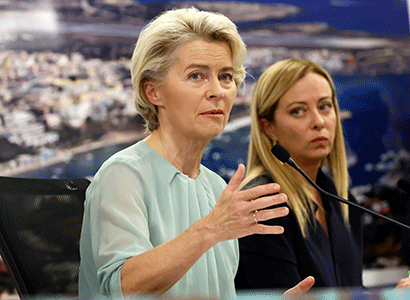Hard right is set to surge in this week’s European Union elections. Center set to tilt to right, too
BRUSSELS (AP) — It seemed like a throwaway line by European Commission President Ursula von der Leyen, yet it encapsulated what is at stake for many in this week’s European Union parliamentary elections — What to do with the hard right? And should it be trusted?
 |
| The President of the European Commission, Ursula von der Leyen (left) and Italy’s Premier Giorgia Meloni, right, address the media during a joint press conference on Sept. 17, 2023. Photo AP |
The top EU leader basically had said that far-right Italian Prime Minister Georgia Meloni, whose party is steeped in post-fascism, could be ready for prime time as a potential coalition partner once the four-day elections across the 27-nation EU end Sunday.
During an election debate, von der Leyen declared that Meloni checked all the necessary boxes, the last of which was “pro-rule of law.” She immediately added, however, “if this holds.”
That provisional question of whether to extend basic trust to extremist and populist parties is on many minds as the EU appears poised to veer rightward unlike it has ever done in its history, which has its seeds in the World War II defeat of Nazi Germany and fascist Italy.
Since the last European elections five years ago, populist, far-right and extremist parties are already leading three governments, are part of governing coalitions in several others and are surging in polls across the bloc like never before.
As a result, the whole political pendulum of the giant bloc is likely to swing toward the right after the elections, a plethora of surveys indicate and political observers agree.
“There will be a shift to the right. So the question is, how big?” said Maria Demertzis of the Brussels-based independent Bruegel think tank. “The numbers will matter because it could very well be that one of the possible outcomes is that the extreme right actually becomes the second (largest) party. If that is the case, then it’s interesting to see how and who will govern.”
In the second-biggest exercise in democracy behind India’s recent elections, almost 400 million voters will elect 720 members of the European Parliament from beyond the Arctic circle to the edges of Africa and Asia, impacting anything from global climate policies and defense to migration issues and geopolitical relations with China and the United States.
For the longest time, the European Parliament elections had little importance, as core members France and Germany set much of the policy for the ever-increasing group and the legislature looked like a retirement home for elderly national politicians and an incubator for young talent. But as the powers of the legislature grew on issues like banking rules, agriculture and the EU budget, so did voting interest and the quality of legislators. While breaking a 50% voter turnout threshold was considered a major step forward in 2019, an EU Parliament survey says 71% could vote in the upcoming elections, another massive step forward.
(Latest Update June 6, 2024)
|